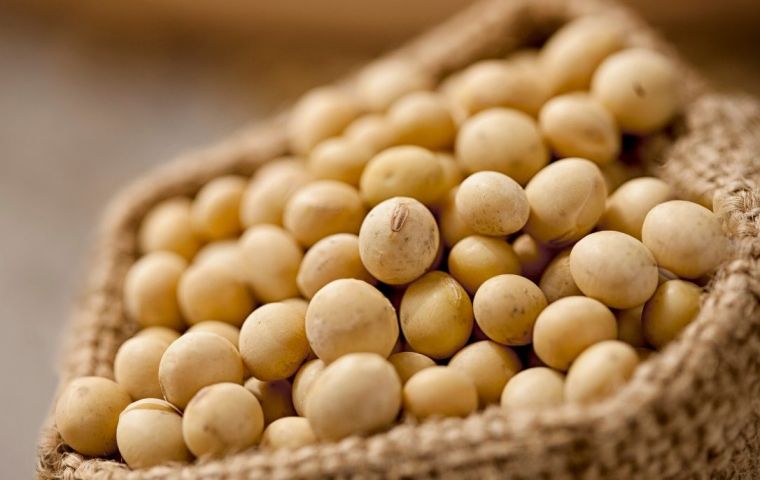MercoPress. South Atlantic News Agency
China to begin selling soybean reserves; plans to ensure food security and self sufficiency
 Soybean meal prices have soared as pig farmers struggle with low prices for their animals in China.
Soybean meal prices have soared as pig farmers struggle with low prices for their animals in China. China will begin the sale of state-owned reserves to increase supply in the world’s largest oilseed market, the National Food and Strategic Reserves Administration announced, although no auction volumes or dates were advanced.
The measure comes after shipments in recent weeks have fallen far short of expected volumes due to climate issues in Brazil and Argentina, where crops have been hit hard by drought conditions and thus slowing the pace of shipments.
Soybean meal prices have soared as pig farmers struggle with low prices for their animals in China.
“Soybean arrivals in February may be fewer than previously projected, and arrivals in March will also fall short from expected. The current situation can be expected to last until April,” Zhu Rongping, agricultural analyst at commodity consultancy Mysteel said.
Likewise some edible oils will be sold as part of an inventory rotation process.
Precisely to avoid these alterations and surprises Beijing announced measures to increase soybean output, according to a major annual policy document as part of its policy to reinforced food security and the most self sufficiency.
The annual rural policy blueprint, known as the “No.1 document,” said that stable farm output and growing rural incomes were critical to healthy development of the country, which is facing challenges from the COVID-19 pandemic, a fragile global economy and climate change.
Though China has long prioritized food security, it has become much more prominent in policy since the pandemic began in the country in early 2020.
The country is largely self-sufficient in key food staples but has faced a major shortage of pork, and a corn supply crunch in recent years, as well as severe weather events.
Already the world’s top soybean importer, China’s small domestic crop fell sharply last year as farmers planted corn instead. The State Council document dedicated a full section to boosting the soybean and oil seeds production “project,” using measures like increasing subsidies for land rotation programs and rewards for counties that produce large volumes of edible oils.
Beijing also said it will “actively” deal with the unfavorable impact from late planting of wheat and strictly control corn-based fuel ethanol production, among other measures seeking to stabilize grain supplies.
China’s corn imports surged to a record last year, amid soaring domestic prices and low inventories.
China also wants to accelerate expansion of beef, mutton and dairy production and “vigorously promote” construction of vegetable facilities in the north while improving emergency supplies.
Last year heavy rains flooded key vegetable-growing areas, sending prices rocketing. That followed a major hit to its corn crop a year earlier from a series of typhoons.
The document said that China will strengthen research into the mid to long-term impact of climate change on agriculture. It also called for acceleration of the development of indoor agriculture such as greenhouses and promotion of advanced equipment and technology.




Top Comments
Disclaimer & comment rulesCommenting for this story is now closed.
If you have a Facebook account, become a fan and comment on our Facebook Page!